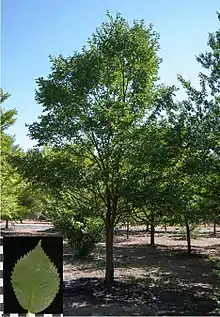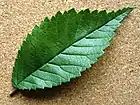Ulmus 'Fuente Umbria'
The cultivar Ulmus 'Fuente Umbria' was raised from seed collected in 1995 from an elm resembling Ulmus minor growing in a field at Fuente Umbria west of Valencia (39°25′23″N 0°56′46″W),[1] by researchers at the Escuela Técnica Superior de Ingenieros de Montes, Universidad Politėcnica de Madrid. 'Fuente Umbria' is one of seven cultivars found to have a very high resistance to Dutch Elm Disease, on a par with, if not greater than, the hybrid cultivar 'Sapporo Autumn Gold'. [1] However, retrospective DNA analysis has revealed that the clone has Ulmus pumila DNA, the species introduced to Spain at the end of the 16th century.[2]
| Ulmus 'Fuente Umbria' | |
|---|---|
 'Fuente Umbria' | |
| Genus | Ulmus |
| Cultivar | 'Fuente Umbria' |
| Origin | Spain |
'Fuente Umbria' was introduced to the UK in 2017, by Hampshire & Isle of Wight Branch, Butterfly Conservation, as part of an assessment of DED-resistant cultivars as potential hosts of the endangered White-letter Hairstreak. [2]
Description

'Fuente Umbria' is comparatively slow growing, achieving a rate of 52 cm per annum in the trials at Puerta de Hierro, Madrid. The branches, which have corky tissue, are erect, forming an irregular crown. The leaves, on 10 mm petioles, are ovate, typically acuminate at the apex, the average length and width 76 × 45 mm, the margins doubly serrate. Foliar density relative to 'Sapporo Autumn Gold' is described as 'medium'. [1] The leaves are the first to flush of the seven Madrid clones where grown in southern England, in mid March.
Cultivation
The cultivar has been evaluated at four sites across Spain, while specimens were planted in England in 2017 at Butterfly Conservation's elm trial plantations in Hampshire, and at Grange Farm Arboretum, Lincolnshire.[2]
Accessions
Europe
- Grange Farm Arboretum, Lincolnshire, UK. Acc. no. 1266. One small whip planted 2017.
References
- Martín, JA; Solla, A; Venturas, M; Collada, C; Domínguez, J; Miranda, E; Fuentes, P; Burón, M; Iglesias, S; Gil, L (2015-04-01). "Seven Ulmus minor clones tolerant to Ophiostoma novo-ulmi registered as forest reproductive material in Spain". IForest - Biogeosciences and Forestry. Italian Society of Sivilculture and Forest Ecology (SISEF). 8 (2): 172–180. doi:10.3832/ifor1224-008. ISSN 1971-7458.
- Brookes, A. H. (2020). Great Fontley Elm Trial, 2020 Report. Butterfly Conservation, Lulworth, UK.